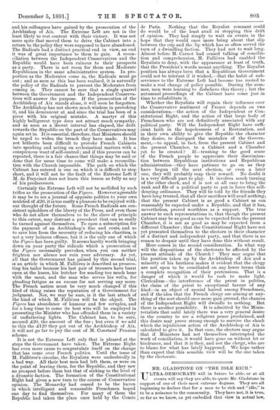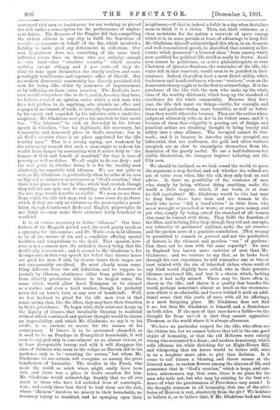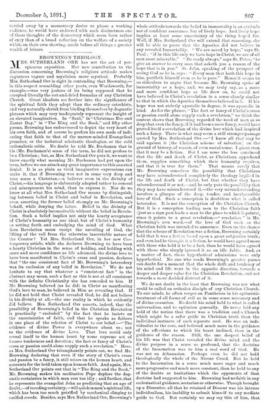MR. GLADSTONE ON "THE IDLE RICH."
ULTRA-DEMOCRATS will in future be able, or at all events will say they are able, to quote Mr. Gladstone in support of one of their most extreme dogmas. They are all beginning to declare that for a man to be rich and " idle," is to be a nuisance to the community. They have not, it is true, so far as we know, as yet embodied that view in actual law, sentenced rich men to banishment for not working,-or placed the rich under a conscription for the performance of unplea- sant duties. The Romans of the Empire did that, compelling the richest citizens in any city to fulfil the functions of curia les, or assessors on behalf of the fist, which involved a liability to make good any deficiencies in collection. Our own Legislature does, too, something of the same kind, inflicting severe fines on those who are unlucky enough to own land—that " absolute security " which secures nothing except obloquy and 2 per cent.—if they de- cline to take upon themselves the utterly useless and exas- peratingly troublesome and expensive office of Sheriff. Bat no modern democratic community has directly punished rich men for being idle, either by sentences of imprisonment or by inflicting on them extra taxation. The Radicals, how- ever, would everywhere like to do it, and in America they have, we believe, created an opinion under which a rich man who does not profess to do anything, who attends no office and engages in no branch of trade, is virtually boycotted, shunned by his equals and regarded by his inferiors with a vindictive suspicion. Mr. Gladstone now gives his sanction to that social law. " The labourer," he said on Saturday in his labour speech in Cheshire, " has his legitimate, his necessary, his honourable and honoured place in God's creation ; but in all God's creation there is no place appointed for the idle wealthy man." That is a strong saying, not weakened by the subsequent remark that such a man ought to redeem his wealth from danger by associating with it active duty to " the honour of God and benefit of mankind," for that is true of poverty as well as riches. We all ought to do our duty ; and the real point is, whether doing it is for the wealthy man absolutely incompatible with idleness. We are not quite so sure as Mr. Gladstone is, particularly when he talks of an area so big and so unknown to surveyors as " God's creation," that there is no place in it for the lilies which God created, though they toil not nor spin, nor do anything which a democrat of the new type would describe as useful. We seem to see func- tions which the idle rich may, and in some cases do, perform, which, if they are only as virtuous as the poor—quite a possi- bility, though Continental Reds and English playwrights do not think so—may make their existence fairly beneficial to mankind.
It is, of course, necessary to define " idleness." Our fore- fathers of the Hogarth period used the word pretty much as a synonym for viciousness ; and Dr. Watts even held idleness to be of the nature of sin, and a condition offering special facilities and temptations to the devil. That opinion, how- ever, is not common now, the orthodox theory being that the devil's ally is overwork ; and it cannot be Mr. Gladstone's, for he expresses in this very speech his belief that shorter hours are good for men, if only by shorter hours their wages are not unreasonably sacrificed. He must clearly mean some- thing different from the old definition, and we suppose he intends by idleness, abstinence either from public duty or from directly productive labour in its largest sense, the sense which would allow Lord Tennyson to be classed as a worker, and even a hard worker, though he probably never did an hour's turn at any sort of handicraft. Well, we feel inclined to plead for the idle men even in that sense, seeing that, like the lilies, they may have their function in God's providence. To begin with, their existence keeps up the dignity of leisure, that invaluable blessing to mankind without which continued and patient thought would be almost an impossibility, and which Mr. Gladstone, we say it to his credit, is so anxious to secure for the masses of his countrymen. If leisure is to be accounted shameful, as it used to be on Sundays in Evangelical households, it will soon be enjoyed only in concealment as an almost vicious, or at least disreputable luxury, and with it will disappear the class of thinkers who seem to the vulgar as Darwin did to his gardener, only to be " counting the worms," but whom Mr. Gladstone, we are certain, will recognise as among the great benefactors of humanity. The stroller in the Porch, who made the world so much wiser, might easily have been rich, and there was a place in God's creation for him. Mr. Gladstone would acknowledge frankly that we all owe much to those who have led secluded lives of contempla- tion ; and surely those best fitted to lead them are the rich, whose " idleness " involves no misery to their households, no necessary injury to mankind, and no sponging upon their neighbours,—if that is, indeed, a foible in a day when Socialists seem to think it is a virtue. Then, too, their existence as a class maintains for the nation a reservoir of spare energy which it is, in some periods at least, of advantage to keep full. Mr. Gladstone himself acknowledged this when, in an eloquent and well-remembered speech, he described that country as for- tunate which possessed " a leisured class " from among which men qualified for political life could so easily be drawn. As all men cannot be politicians, or active philanthropists, or even Chairmen of Quarter-Sessions, the remainder of the idle, the water left in that reservoir, would seem to be justified in their existence. Indeed, they often have a most direct utility, which tradesmen and handicraftsmen who are " workers," even on the democratic theory ought to be the first to acknowledge. It is the purchases of the idle rich, the men who make up the whole class of the wealthy dilettanti, which keep up the standard of excellence for the whole community. Because they have time, the idle rich insist on things—cattle, for example, and horses and gardens—being more beautiful, as well as better than they would otherwise become. They are the critics whose judgment ultimately tells on Art in its widest sense, and it is because of them that vulgarity is passing out of design, and practical artists are straining thought to bring beauty and utility into a close alliance. The occupied cannot do that work ; and it is because in America only the occupied are influential, that her craftsmen, the gold and silver workers excepted, are so slow to emancipate themselves from the dominion of the purely useful. To use a half-ludicrous but visible illustration, the loungers improve tailoring, not the City men.
We should be inclined, as we look round the world, to press the argument a step farther, and ask whether the refined are not of value even when, like the old, they only look on and advise. Is there no possibility of the existence of men who, simply by being, without doing anything, make the world a little happier, which, if not work, is at least its full equivalent? Mr. Gladstone would be the last man to deny that there have been and are women in the world who never " did a hand's-turn " in their lives, who never wrought or preached or wrote, or even gave money, and yet who, simply by being, raised the standard of all women who came in contact with them. They fulfil the function of the lilies, and in being lilies they, though they toil not, nor spin, nor subscribe to gardeners' asylums, make the air sweeter, and the garden more of a gracious consolation. (That, we may be permitted to remark en passant, and not the production of flowers, is the ultimate and peerless " use " of gardens.) Can there not be men with the same capacity ? No man in England has known more varieties of men than Mr. Gladstone ; and we venture to say that, as he looks back through his vast experience, he will remember one or two at least tainted with the sin of inherited riches, whom work of any kind would slightly have soiled, who in their gracious idleness sweetened life, and lent it a charm which, lacking them, it had sadly missed. There may be, there often is, charm in the idle ; and charm is a quality that benefits the world, perhaps sometimes almost as much as the strenuous.
ness which is so admirable, and leaves behind it such an addi- tional sense that this earth of ours, with all its offerings, is a most fatiguing place. Mr. Gladstone does not find it so; but then Mr. Gladstone is himself, and a Scotchman on both sides. If the men of that race have a foible—be the thought far from us !—it is that they cannot appreciate Thomson, or the world where it is always afternoon.
We have no particular respect for the idle, who often are the vicious too, but we cannot believe that toil is the one good object of humanity, or that the old Hebrews were utterly wrong who accounted it a doom; and modern democracy, which calls idleness sin, while shrieking for an Eight-Hours Bill, and whispering that six hours would be better still, stirs in us a laughter more akin to pity than derision. Is it sense to call leisure a blessing, and throw stones at the leisured man ; to reckon flowers among the charms of life, and pronounce that in " God's creation," which is large, and con- tains, astronomers say, blue suns, there is no place for the man who toils not, but who may by existing be the best evi-
dence of what the graciousness of Providence may mean ? Is the thought, common to all humanity, that one of the attri- butes of Heaven is rest, absolutely from the pit ? We hesitate to believe it or to believe that, if Mr. Gladstone had not been
carried away by a momentary desire to please a working audience, he would have endorsed with such distinctness one of those thoughts of the democracy which seem born rather of envy than of a broad reflection on the welfare of a society which, on their own showing, needs before all things a greater wealth of leisure.




















































 Previous page
Previous page